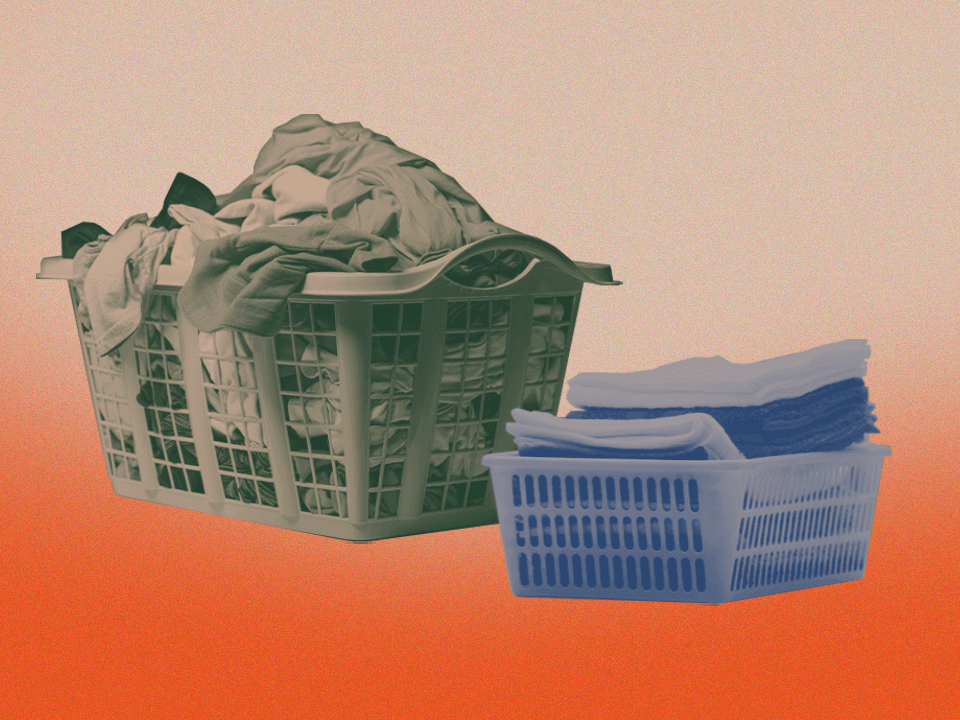11 Organization Tips That People With ADHD Swear By
Did your life just get easier? Yes, yes it did.
If you’re one of the millions of U.S. adults living with ADHD, you’re probably no stranger to feeling super disorganized and overwhelmed at times (or even all of the time). And there’s a reason for that: ADHD affects the brain’s executive functioning skills, which can make organization, planning, and following through with tasks more difficult, says clinical psychologist Karen Caraballo, PhD.
Whether you have a predominantly inattentive presentation (the type that makes it hard to pay attention to details or follow through on a task), predominantly hyperactive-impulsive presentation (the kind that makes it tough to sit still or wait your turn), or combined presentation (when both types of symptoms show up equally), living with ADHD sometimes means hopping from one thing to another without accomplishing as much as you’d like, according to the National Institute of Mental Health (NIMH).
But, even if it takes extra work, there are plenty of strategies you can use to feel a little more orderly (more on that below). However, because everyone’s ADHD symptoms are different, the key is to find hacks that work for your specific needs, says licensed therapist Lindsay Fleming, LPC, who happens to have ADHD herself. The best way to do that is to test out new strategies and stick with them for a couple of weeks at a time to see if they benefit you, she adds. A good way to tell if an organizational hack is working: Ask yourself whether it’s making your life easier or your symptoms less bothersome, says Michelle Frank, PsyD, clinical psychologist and author of A Radical Guide for Women with ADHD. If it’s taking up a lot of your time and energy, ditch it.
Below you’ll find expert-approved organization tips designed to help you work with your brain so you can finally chill the hell out.
1. Make your bed.
If just the thought of trying to keep your bedroom clean 24/7 is enough to send you into an anxiety spiral, commit to a smaller task like making your bed every day, suggests Fleming. That one action feels a lot more manageable, and once you solidify the habit, you can move on to another small step to make your space feel a bit tidier. When you have ADHD, it’s easy to feel like your home is just destined to be messy forever, but creating small helpful habits will help you challenge that mindset and start to feel more in control, says Fleming. Before you know it, you’ll have a mini cleaning routine going. But don’t stress if you fall out of practice every now and then.
2. Break organizational tasks into chunks.
A lot of people who have ADHD struggle to “activate,” or start tasks, so breaking a to-do down into smaller steps can make it easier to get started, says Dr. Frank. It also helps decrease overwhelm, which people with ADHD are prone to, she adds. Let’s say you want to organize your inbox at work. Rather than going through all 500 of your unread emails and sorting them into appropriate folders, start with the first 50 messages (or whatever number feels doable). You should give yourself permission to stop and come back to the task the next day so that you don’t feel overwhelmed, says Dr. Caraballo.
The same goes for decluttering your house; you’ll have a much easier time if you focus on one room at a time and break it down into areas within each room instead of trying to tackle the whole thing in one day.
3. Do a start-of-day or end-of-day clean.
You’ve probably seen the satisfying morning and evening cleaning videos on TikTok, which some users call their homes’ opening and closing shifts. And it turns out they’re onto something. Cleaning a high-traffic area of your home, like your kitchen or office, for 10 to 15 minutes every day can ensure that the mess doesn’t get out of hand, says Dr. Caraballo.
This can be helpful for people with ADHD because it’s small and simple and it creates a regular routine. “ADHDers have a tendency to let things build, build, build, and then they’ll spend all day cleaning,” explains Dr. Frank. If you try this hack, just be sure to give yourself a time limit and move on once it’s up—otherwise it can feel like a daunting, never-ending chore.
4. Find a permanent home for the things you lose.
If you’re always misplacing your keys (like Fleming says she used to), put a hook right by your door and try to get in the habit of hanging your keys there every time you come home. Having designated areas where important items like your mask, phone, keys, and wallet live can be a great strategy if you feel like you’re constantly looking for those things when you wanna get out the door.
This strategy can be helpful because it supports working memory, aka the ability to hold information in your head and use it to solve a problem later, which some people with ADHD struggle with, says Dr. Frank. If you create a permanent home for your essentials, then you don’t have to waste brain power remembering where you left them.
5. Buy a basket for clean, need-to-put-away clothes.
If your room is currently covered in clothes you tried on and changed out of or wore once and threw on the ground before bed, this one’s for you. Because it can be tempting to just toss these clean clothes in the dirty laundry hamper and move on with your life OR procrastinate putting them away for days (or weeks? No judgment), Fleming recommends that her clients have two baskets in their rooms—one for clean clothes and one for dirty clothes. This way, your bedroom will feel more organized even if you don’t have time to hang your clothes back up until later. And because clutter can feel especially distracting if you have ADHD, this hack is a great way to eliminate a major source of it without much effort.
6. Use clear bins to sort things.
While you might be tempted to buy some pretty wicker baskets to organize your work essentials, clear bins are actually your best friend if you have ADHD. A lot of people with the condition struggle with keeping things in drawers or opaque containers because if something important is out of sight, it’s also out of mind, says Dr. Frank. If clear bins don’t fit your home’s ~aesthetic,~ consider using labels so you have a better idea of what you’ve put where.
7. Get a planner (and check it often).
A planner is a must if you find it hard to keep track of work deadlines or personal to-dos. It doesn’t matter whether you use a physical planner or a digital one, as long as you’re being diligent about marking down important deadlines and checking your planner at least twice a day (say, in the morning and before you chill out for the night) to make sure you haven’t forgotten about anything, says Dr. Caraballo.
Having a space where you can find all of your important tasks and deadlines is helpful for those with ADHD for a few reasons. First, it eliminates working memory issues since you no longer need to keep all of the info in your head. Plus, it can help with prioritization and, finally, it ensures that your must-dos won’t be out of sight and out of mind, says Dr. Frank. Google Calendar is a great option because you can access it from your phone or computer no matter where you are, so you’ll never accidentally leave it at home, adds Fleming.
8. Categorize your tasks.
Once you’ve found a planner system that works for you, separate your to-dos into personal and work-related lists. From there, identify which tasks are top priority (typically those are the ones with hard deadlines), says Dr. Caraballo. This way, you’re less likely to feel overwhelmed by everything you need to get done. After you’ve identified the tasks that you need to complete for the day, you can break the most intimidating to-dos into smaller, more manageable steps if you need to. From there, focus on one thing at a time since multitasking is often difficult when you have ADHD, she adds.
9. Try time blocking.
A lot of people with ADHD tend to be very visual, so thinking about what your schedule physically looks like is important, says Fleming. Breaking the day into clear time blocks with specific tasks you plan to do can help your day feel a lot more organized.
The caveat: Make sure you’re accurately estimating how long each activity will take so your plans don’t get derailed. If you’re someone who struggles with estimating how long something will take, try timing yourself each time you do a specific task to get a more accurate picture. Yay for realistic expectations!
10. Experiment with set focus time.
Meet the Pomodoro technique. This involves choosing a task that you want to focus on completely, like cleaning out your fridge or going through the mail that’s been sitting on your desk for a month, and working on it in 25-minute increments without interruptions. Once the time is up, you can take a short five-minute break. Repeat this pattern a few more times, then reward yourself with a longer break.
This technique can be helpful for people with ADHD because you’re carving out dedicated focus time to get something done (in this case, an organizational task). That said, those who struggle to get back on track after taking a break might not have as much success with this one, says Fleming.
11. Use the buddy system.
If your biggest organization challenge is finding the motivation to get started, consider enlisting your partner or a friend to hold you accountable, says Fleming. Have them sit with you while you organize your desk or clean your bedroom, and ask them to remind you of your goal if they notice you’re starting to get off task.
Accountability buddies are especially helpful for people who have ADHD since the condition makes you more likely to get distracted and forget about the projects you start, which can lead to a lot of wasted time and incomplete tasks, Fleming explains. But keep in mind that having a partner or friend around can also be a distraction. So engage in a little self-assessment about whether you think it would help and be strategic about who you ask to join you, adds Dr. Caraballo.
Wondermind does not provide medical advice, diagnosis, or treatment. Any information published on this website or by this brand is not intended as a replacement for medical advice. Always consult a qualified health or mental health professional with any questions or concerns about your mental health.




